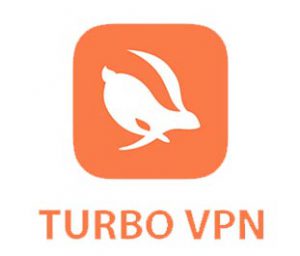TOP FEATURES
- Excellent speed and reliability
- Large selection of applications for different devices
- Amazing privacy features with encryption, and leak protection settings
COMPATIBILITY
- Windows
- macOS
- Android
- iOS
- Linux
- Routers
85%
- Excellent speed and reliability
- Large selection of applications for different devices
- Amazing privacy features with encryption, and leak protection settings
Compatibility: Windows, MacOS, Android, iOS, Linux, Routers
Turbo VPN is one of the most popular free VPN services for mobile devices. Android’s application hub: Google Play, reports the Turbo VPN has had more than 50 million downloads so far. The free service gives users access to up to nine servers across three continents: North America, Europe and Asia. At the moment, the VPN has no bandwidth limits or restrictions that most VPN services inflict on users.
However, everything is not as it seems from the surface. Turbo VPN has an excessive amount of loopholes and faults that make it an unworthy choice if you’re concerned with your privacy and security.
We detected problems from the onset and noticed that the VPN’s on own website didn’t have support for HTTPs connections. Even when we manually entered the URL ‘https://www.turbovpn.co’ into the browser address bar got us the ‘err_connection_reset’ error.
Regardless of how many times we tried, the website refused to connect.
Any one would expect that a VPN provider would have the technical prowess and expertise to manage the security of its own website. However, Turbo VPN expects us to entrust our personal data to them when they themselves are not serious about their website’s security.
Upon further investigation, we discovered that the VPN itself was not much different from the software’s website. Though the VPN has some cool features, it has plenty of underlying problems that compromise your privacy and security. In this Turbo VPN review, we will explain that why you should avoid using Turbo VPN.
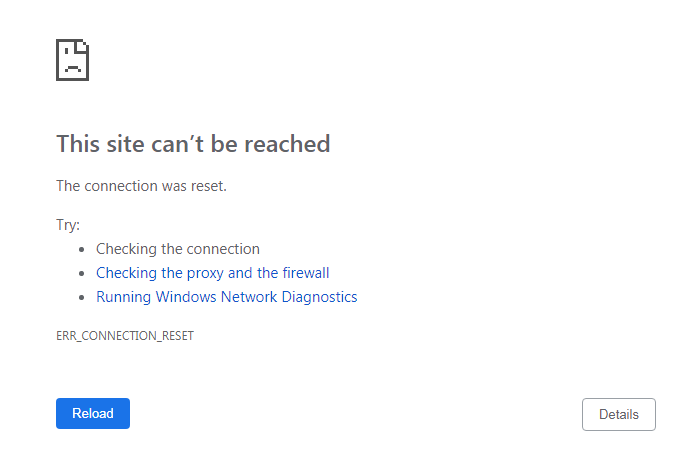
Pros
- Free plan
- Unlimited bandwidth
- 9 locations minimum
- Unblocks Netflix
Cons
- Below average speeds
- Works with mobile apps only
- Very expensive monthly plan
- Not very configurable
EXPERT QUOTE
A VPN is one of the most important tools that you need if you use the internet regularly. The technology was designed to help protect internet users from threats such as hacking, as well as help make their internet use as private as possible.

Joel Timothy
Cyber-Security and VPN Expert
VPN Alternatives
Turbo VPN Pros
As we’ve discussed before in our previous articles that most free VPNs are not good. The majority of these VPNs have many problems as they lack essential security features. You can find some of the same issues in Turbo VPN.
Though, we agree that Turbo VPN is a bad choice but it certainly isn’t the worst we’ve seen. It offers some cool features to its customers but these features are not nearly as enough on their own. Still, it’s important that we mention these features.
Advanced Protocols and Encryption
Most free VPN services have lapses in security but a few of them have these features. One of those important security features is the VPN’s encryption method. The encryption method of a certain VPN is necessary to ensure that the personal data of users stays hidden from prying eyes.
The best encryption method in the VPN industry at the moment is the AES-256 bit encryption algorithm. The algorithm is renowned to be the safest VPN encryption method in the VPN industry.
The algorithm has military-grade protection and ensures that no data gets leaked through the connection. The encryption method is so secure that government agencies like the FBI, CIA and the NSA use the method to secure their confidential information. Due to the VPN’s advanced encryption algorithm, it’s easier to transfer sensitive banking information without the possibility of leaks.
That’s not all; the method has been proven to be uncrackable even after supercomputers were deployed to test its strength. All top-grade VPN services use this encryption method. Somehow, Turbo VPN has its hands on this technology as well.
Besides that, the VPN also has a secure tunneling protocol. A secure VPN tunneling is also a necessary security feature that every VPN service should have. Without a secure VPN tunnel, all your personal data can get spoofed. Encryption and tunneling protocols go hand-in-hand ensuring the safety of your personal data.
At the moment, OpenVPN is the fastest and the safest VPN tunneling protocol in the VPN industry. The VPN protocol creates a secure virtual tunnel where the connection gets routed to the destination.
As a result, it is almost impossible to crack this secure combination of a powerful encryption protocol and a safe VPN protocol. Both of these features ensure that the data doesn’t get compromised by an external force. The encryption algorithm and tunneling protocol are the most redeeming features Turbo VPN.
The only remaining threats to your anonymous web browsing experience are DNS or WebRTC leak. Both these features are cool to have but they still lack a kill switch which is necessary to minimize the probability of a leak.
On the other hand, VPNs like Nord VPN offer DNS and WebRTC protection. Even if you’re looking for a free or cost-effective VPN, Turbo VPN isn’t the best. UltraVPN offers more features in its free version and does a better job in keeping your information private.
However, this also means that Fire Stick users can use the VPN to watch Kodi on their smart TVs. The VPN’s compatibility with Fire Stick and smart TVs ensure that users don’t have to compromise on their streaming experience.
Leaks Not Detected
Leaks are a major problem when it comes to VPNs. Having a leaking VPN nullifies all the other benefits a VPN has. Leaks can happen to even one of the best VPNs and there is no surety that a VPN always be successful at curbing leaks.
Most VPN leaks happen in two forms. One of the most common leaks is a DNS leak that. The DNS leak happens when the Internet Service Provider (ISP) is available to bypass the VPN tunnel because of some faulty default setting. As a result, the user’s gets leaked to the ISP. It happens most frequently with VPNs that don’t own their own DNS servers.
The other most common leak is a WebRTC leak that’s caused by a security feature in web browsers. In this type of leak, APIs working with the WebRTC Project interfere with the tunnel of the VPN. WebRTC leaks are the perfect example of a useful feature going wrong.
Leaks are dangerous to a secure browsing experience. This is why we checked the VPN under a strenuous testing process to ensure that it doesn’t leak your IP address.
We put Turbo VPN through two different tests. To our surprise, the VPN managed to pass all two tests and didn’t report a single leak.
First of all, we tried to detect any IP leaks in our VPN browsers through the famous website called ipleaks.net. The website confirmed that the VPN didn’t have any IP leaks and all its DNS servers weren’t leaking the IP address. We had connected to a VPN server in Singapore to check the problem.
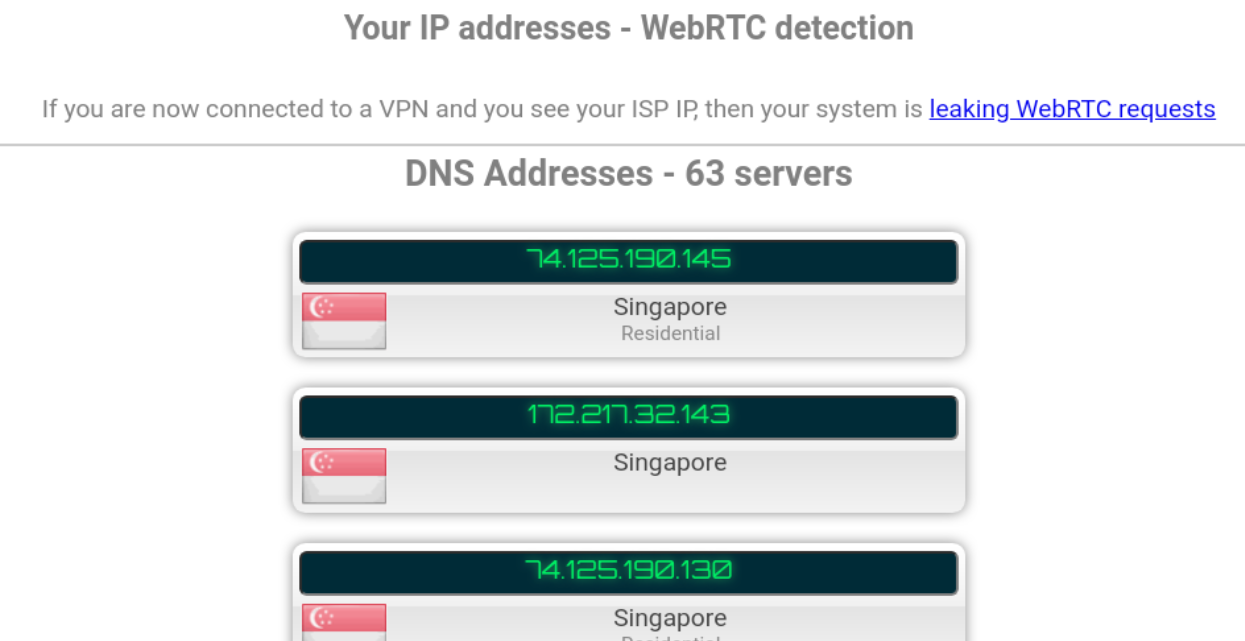
On the other hand, we tried to evaluate whether the VPN services manages to prevent WebRTC leaks while operating. Turbo VPN also managed to prevent those leaks this time.
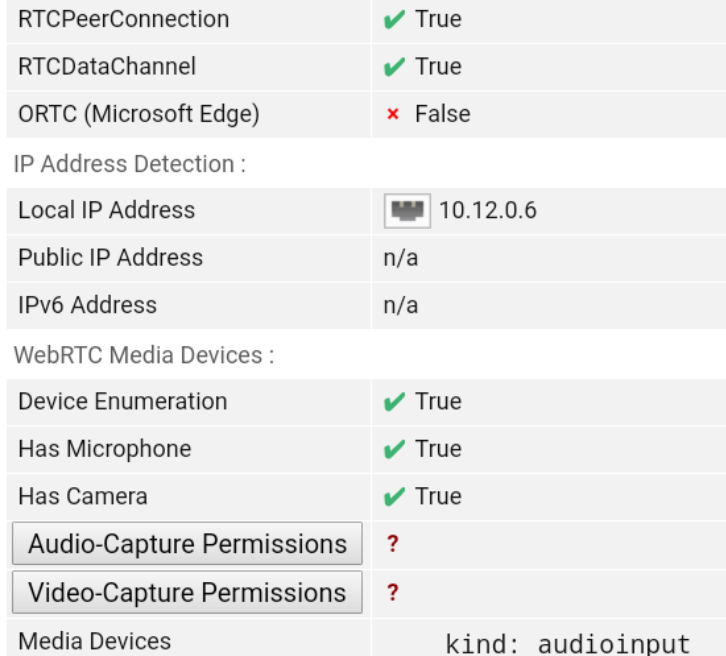
Normally, it’s recommended to test the VPN for viruses to identify any attempts to inject malware during installation. However, since the VPN is a mobile-only application, carrying out that test wasn’t possible applicable.
Works With Netflix on VIP Servers
Netflix has a stringent policy around the accessibility of its content. It restricts people from seeing content that’s only dedicated to a specific country. Therefore, people have to utilize VPN services to bypass these restrictions and watch their favorite content.
However, Netflix is a bit creative than YouTube and actually manages to get a hold on VPN services that try to circumvent its restrictions. Netflix is successful in blocking the majority of VPN services.
Turbo VPN claims to bypass these restrictions but as we know it has not been the first one to claim such a thing. Many VPNs advertise themselves as a VPN tat unlocks Netflix and other restricted content. However, most times these VPN services don’t live up to their words.
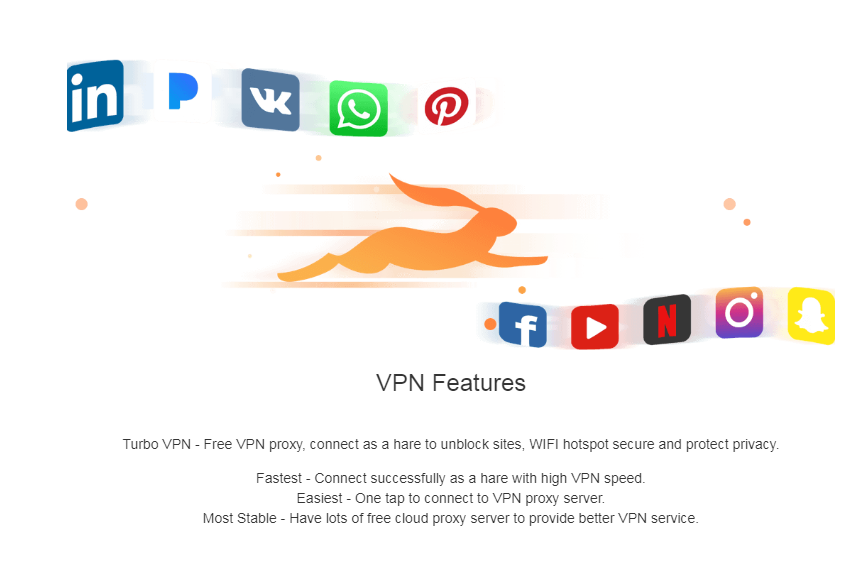
The reason behind this is that Netflix is vigilant when it comes to regional distribution of content. It identifies the servers that cater blocked content to VPN users and immediately blacklists them. After that, these servers are no longer able share restricted content.
Turbo VPN too provides Netflix support for its paid VIP servers but we doubt it’ll be able to bypass the Netflix on a regular basis.
Torrent Support
Torrenting is the best way to distribute large files across multiple users in a fast and easy manner. The method takes a simple approach of distributing huge files. It breaks the file to tiny pieces and scatters them across the users who need that certain file.
However, the method is also extremely risky as it exposes your system to other users. Whenever you torrent a file, you are opening your system to other users. Naturally, not all of them are concerned for your safety. In reality, some of those users can exploit torrents to harm you.
These days, there is a growing number of cybercriminals who are using popular torrenting sites to launch attacks on torrent users. A VPN prevents its users from falling victim to such attacks.
The VPN service is able to encrypt crucial information of its users from prying eyes. Moreover, it will also keep you safe from legal repercussions of downloading material that has copyright disputes.
Many VPN services penalize torrenting because of illicit distribution of copyrighted material on torrent websites and the legal ramifications that come with it. Some VPNs dissuade their users from torrenting by not offering support for P2P at all. There are others that restrict bandwidth or throttle speed of users that engage in torrenting.
However, Turbo VPN does no such things. On the contrary, the VPN encourages its users and doesn’t impose any restrictions on torrent bandwidth. Still, we shouldn’t forget that most torrent users torrent for content though their desktop devices.
Turbo VPN is only available to mobile devices. As a result, users are unable to reap the full benefits of torrenting. Mobile devices have limited capacities compare to desktop devices. As a result, users aren’t able to download their favorite content as much as they like. So, the VPN doesn’t affect your ability to torrent content directly but limits it indirectly.
Turbo VPN Cons
Turbo VPN has some useful features. The VPN has every necessary feature to protect its users from external threats. However, the biggest risks to Turbo VPN users don’t come from external threats but from the VPN itself.
Turbo VPN has dubious log policies that make cautious users suspicious about their service. Moreover, their service is also festered with slow speeds, lack of adequate servers and limited availability of the VPN on other platforms.
Modern VPN users need protection on each of their devices not just their mobile device. People need a private connection to surf the web on their computer, gaming console and streaming devices as well. Because Turbo VPN is a mobile-only application, it’s useless for most VPN users.
Besides that, Turbo VPN has a non-existent customer support which rounds off how underpowered the VPN service really is.
Questionable Logging Policy
Logging has always been a crucial topic of discussion when we’re evaluating the effectiveness of a VPN service. There are a number of VPN services that are decent themselves but fail at ensuring privacy because they don’t have a comprehensive logging policy.
Logging is a vast topic and there isn’t any one type of logging. You can find logging in all shapes and sizes when it comes to VPNs. It is also the area where most free VPNs fail to make a good impression. This is why people are mostly suspicious of VPNs that offer their services for free.
As the old saying goes, “There’s no free lunch.” People realize that sometimes getting free services means that you yourself are being sold as the product.
The same thing can be applied to VPN services. We all know that catering VPN services on a global scale isn’t cheap. Running a VPN service across several countries costs a fortune. The company has to bear the expenses of operating and maintaining servers.
This is why some free VPN servers run their operational costs by selling personal information to advertising forums to pay for their free services. We have seen that almost every VPN swears that it doesn’t log any kind of information. However, we also know that the majority of VPNs keep logs in some form or the other.
To find out the extent of which a VPN service logs information we need to examine its privacy policy. Doing so will clarify how sincerely that VPN is protecting your personal data. Upon investigating Turbo VPN’s privacy policy, we found that the VPN didn’t live up to the expectation of its users. As you can see, the VPN has dubious statements that tell what they actually log.
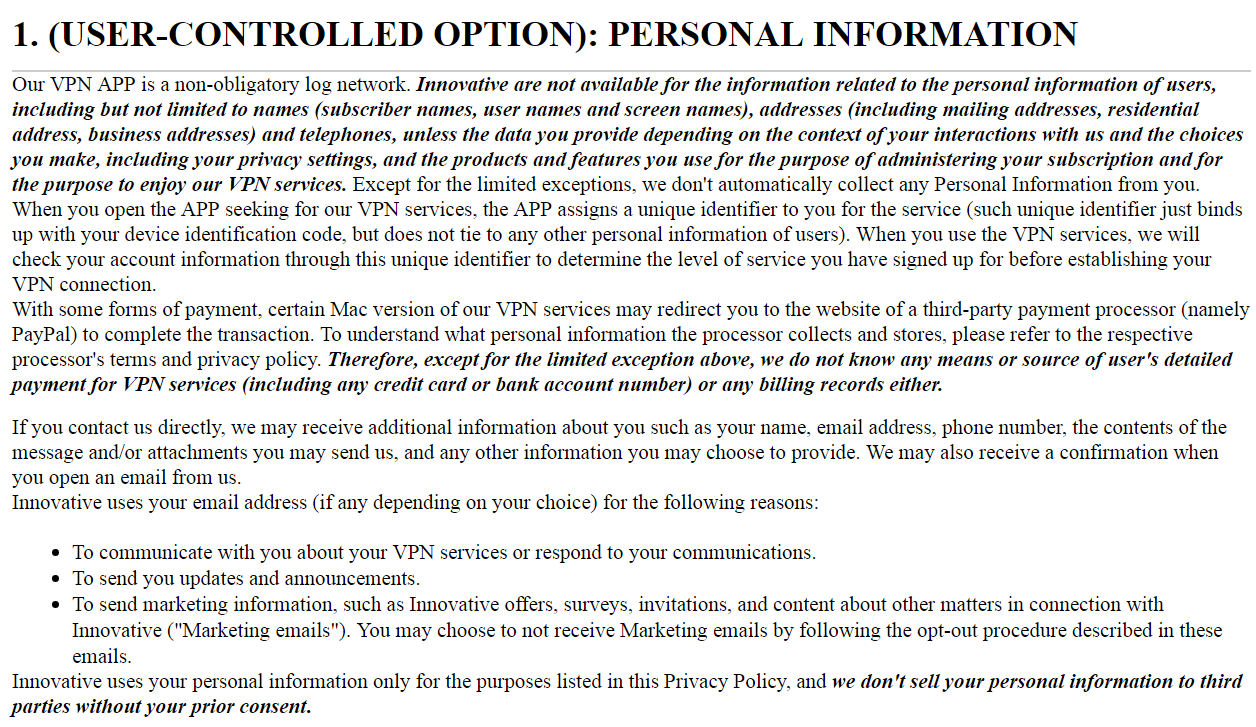
Here they claim that the VPN collects minimal information (so much for a no-log policy). However, their logging policy becomes more questionable as we go on.
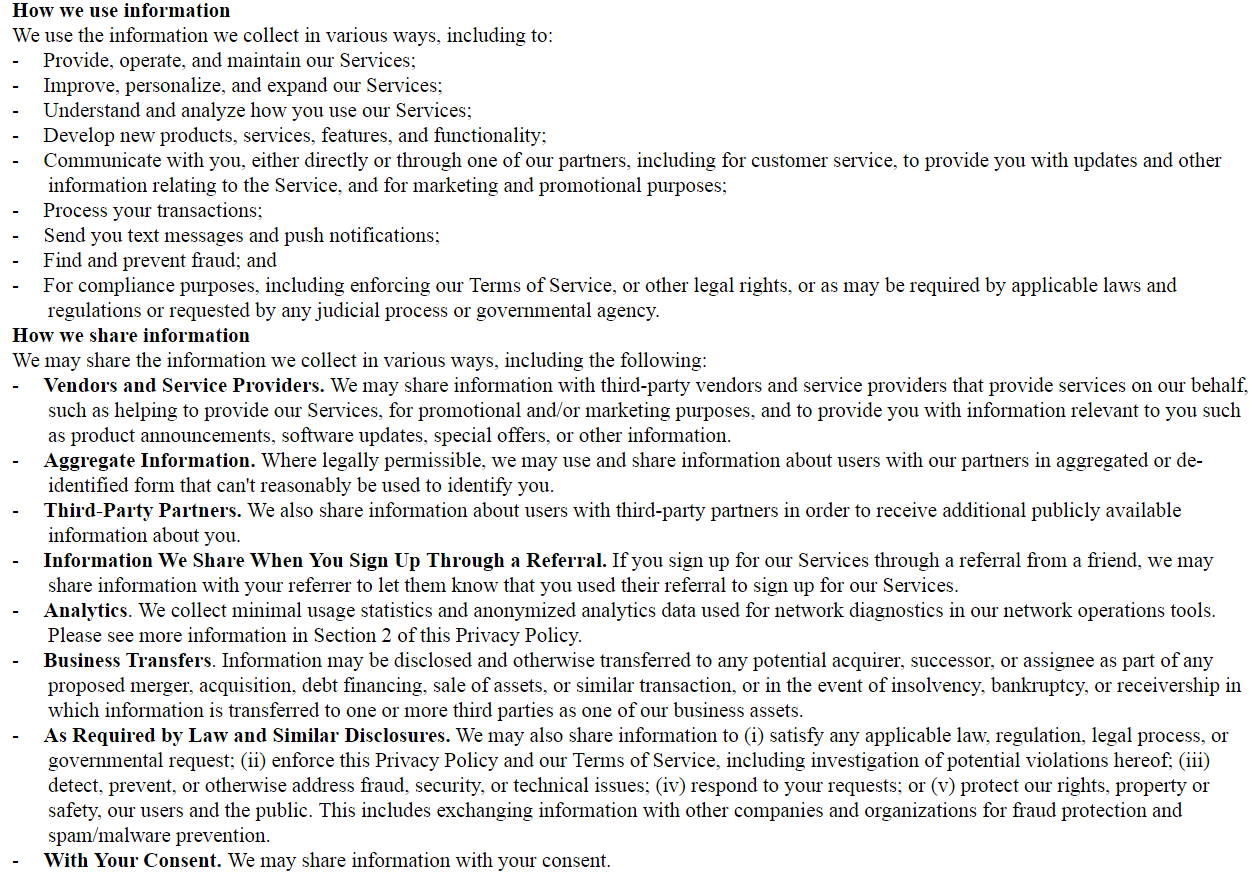
As we can see here, Turbo VPN plans on sharing user information to third parties. The privacy policy clearly states that the VPN intends to share information in many other circumstances such as business transfers, for analytics and for many other things.
VPN services that sell user information to third parties compromise the privacy of their users. Moreover, this indicates that the VPN service has a log in some form or the other which allows them to share information.
VPN users who prioritize privacy should avoid any VPN that share their personal data to third parties. Even if a VPN has powerful encryption, safe tunneling protocols and leak-free connections, your privacy will still get compromised because of a flawed log policy.
Chinese Jurisdiction
Turbo VPN has a Chinese home-base which puts them well outside the extended version of 14 Eyes Surveillance Alliance. This agreement between 14 countries allows them to collectively spy on each of its users and share information about the identity of any user that violates the laws of the respective country. This alliance virtually includes half of the developed world:
- Australia
- Belgium
- Canada
- Denmark
- France
- Germany
- Italy
- Netherlands
- New Zealand
- Norway
- Spain
- Sweden
- The United Kingdom
- The United States
Any VPN service that has its base in any one of these countries always has a privacy threat lurking somewhere. Therefore, having your information compromised in one of those countries is nothing short of a nightmare for a privacy conscious VPN user.
We can see that China isn’t a part of this list. So does that make Turbo VPN an ideal choice for privacy centric users?

The short answer is no.
Although VPN users won’t get bothered by any of those 14 countries, they still have to face the wrath of the Chinese. The Chinese government is not known for their friendliness for privacy. On the contrary, China has made quite a lot of effort in curbing the free use of internet in its country.
The repressive censorship of internet use in China is second to none (except North Korea, of course). The government of China fights a continuous battle with foreign websites and promotes home-grown alternatives in their place. Most foreign websites get blocked by the “Great Firewall of China.”
The Great Firewall is as daunting as it sounds and blocks websites like YouTube, Facebook, Google and Twitter. It doesn’t end there; China takes strict action against any VPN service that tries to operate within its borders. If any Chinese citizen gets caught using a VPN service not approved by the government, has to face legal action which include heavy fines.
These preconditions are alarming for users as they certainly should be. Many people suspect that the government only allows those VPN services to operate that collaborate with the Chinese government.
Moreover, the recent spat between the US and China over Huawei has injected further life into rumors. People are afraid that they might get spied on if they use Chinese technology and products.
So, if you were thinking of running away from the 14 eyes surveillance, then you’d face a much stricter Chinese adversary when using Turbo VPN.
Slow Speeds
Turbo VPN has a fast-running hare for its mascot and doesn’t shy away from portraying itself as a speedy service. Even the VPN’s official website claims that it connects its users with “the speed of a hare.”
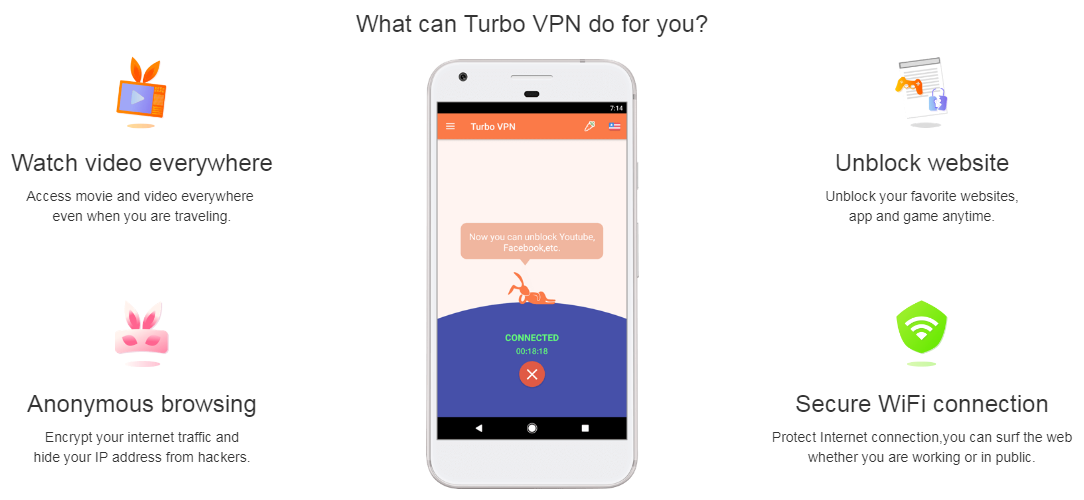
However, after we checked the VPN’s speed ourselves, we realized that it was making a reference to the famous Tortoise and the Hare story. You would remember how the hare failed to do anything and kept lounging at one place until it failed to reach its goal. That’s exactly what happens when we use Turbo VPN; it puts its users at a standstill.
We all know that VPN services affect the speed of our connections. This is necessary they do it to make our connections more safe and secure. So, it’s a part of the price you give for an anonymous browsing experience.
However, high-performing VPNs only have a minimal affect on the speeds of your connections. All top-tier VPNs try their best to be as fast as they can. Plenty of factors affect how these VPN perform. These factors also govern how fast a VPN can be at a certain point.
The tests conducted on Turbo VPN revealed that it failed to overcome all those factors to retain favorable speed. The famous VPN watchdog Tech Radar tested Turbo VPN with its extended testing tools. They found the VPN to be not only short of what it promises but far worse than we expected.
Connections made to local UK servers only garnered speeds between 15-25Mbps on downloading. When the testing team switched to European servers, its performance sloped down even further. The performance of servers in France, Netherlands and Germany was dismal. These servers failed to cross downloading speeds of 10-15Mbps.
The US connections struggled to ace speeds of 3-5Mbps. On the other hand, Indian servers managed speeds up to 7Mbps.These speed scores are rather disappointing and not at all what we expect from a top-tier VPN service.
Limited Device Support
As we have mentioned before, one of the most disappointing flaw in Turbo VPN its limitation on device support. Turbo VPN is only available on for mobile devices. It makes the VPN completely useless for users that have personal desktops, routers and streaming devices such as Fire Stick and Fire TV.
All top-tier VPNs try to offer support to every platform they can. Turbo VPN on the other hand, alienates the majority of VPN users by limiting platform support. Users who choose Turbo VPN will have to pay for other VPN services to have safe browsing on other devices.
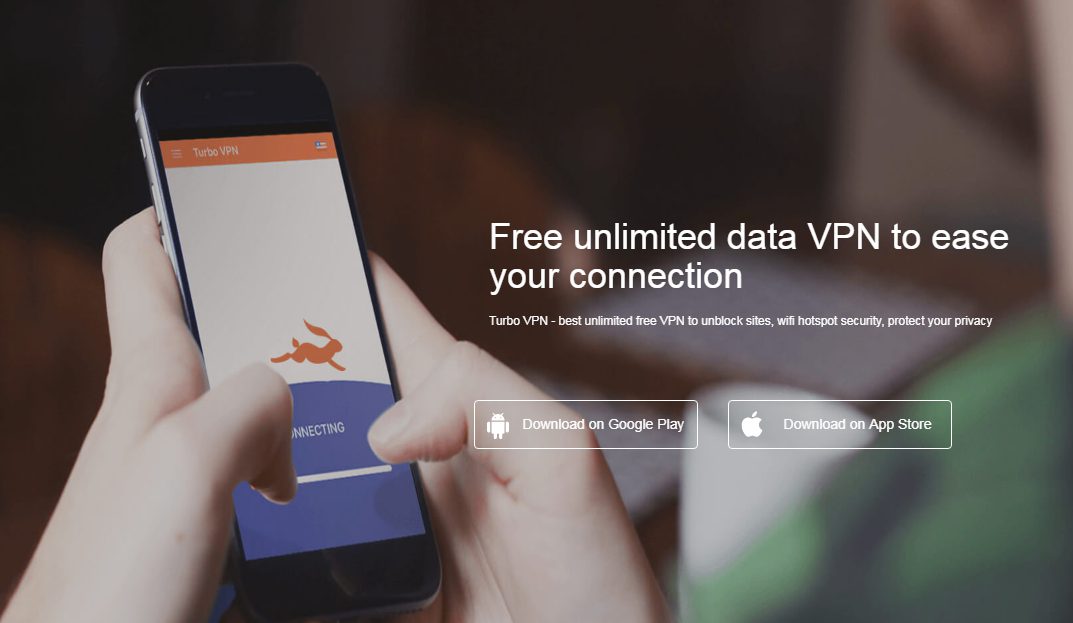
It would be wiser to choose a VPN service that lends you support for other platforms including mobile platforms. Most VPN services offer support to up to 5-10 devices from a single VPN account. It means that you can utilize a single account for all your personal devices, whether they are mobile, desktop or other peripheral devices.
Limited Servers
The amount of servers a VPN has to offer directly corresponds with the VPN’s ability to retain speed and offer quality service. It is one of the major factors that you should always consider while choosing a VPN service for yourself.
Greater number of servers plays a huge role in helping users having a strong and stable connection. The closer a server is to a user, the stronger the connection the user will have.
Turbo VPN, however, offers a minimal amount of servers even to people who pay for the service. The VPN service only has 26 servers across 9 countries. This is insufficient, even for VPNs who provide free services.
For instance, one of the best free VPN services: UltraVPN offers servers locations in up to 30 server locations in 28 countries. This amount is for its free version. The paid version offers support for up to 52 countries over the globe.
On the other hand, Nord VPN offers up to 5200 servers across the globe. The VPN service has its presence in every major city of the world. This is ridiculously higher than the number of servers VIP members of Turbo VPN get (26 servers).
No Kill Switch
A kill switch is the feature that completes the suite of privacy features for any VPN service. A kill switch ensures that no IP gets leaks if the VPN connection drops or gets terminated for some reason. It provides an additional layer of security for VPN users who prioritize privacy.
Though the Turbo VPN client has plenty of good privacy features, it fails to add value by including a kill switch. As a result, Turbo VPN users get deprived of the last line defense against leaks. In the case the VPN connection of these users gets dropped, the IP of these users can get compromised.
It’s an excellent tool but Turbo VPN fails to distinguish itself by not incorporating it.
Ease-of-Use and Ads
When you start with the VPN, you will be bombarded with several permissions. Sometimes, you would also have t verify that information with your fingerprint. After you open the application, you’ll start automatically with a server running your connection.
It seems that the VPN selects the fastest server by itself and users have no options to choose the serve of their choice. However, these connections are not stable most of the time, so you’d end up switching servers randomly.
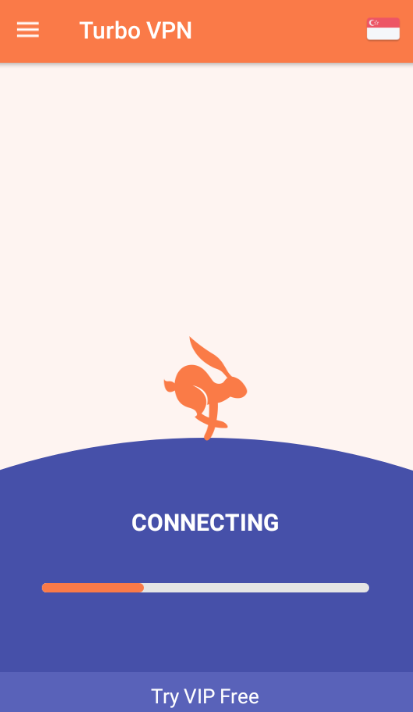
We tried to log into Chrome to test whether the application was working as it should. However, the application was still registering our original IP. But we then realized the VPN only makes your connection private if you use the application’s own internal browser.
Something that you will notice almost immediately about the VPN service is that it is literally crawling with advertisements. It is quite clear how Turbo VPN manages to generate the bulk of its revenue.

The VPN has a lot of stake in advertisement and you’ll see annoying ads almost everywhere you look. These ads show up on a regular basis and disturb the user every now and then.
High Cost for VIP Plan
Turbo VPN continually promotes itself as a free service. The service completely relies on its hoard of ads to cover up its operational costs. However, the VPN has a paid VIP version as well. We were expecting the price to be low; however, it was far from it.
Turbo VPN is ridiculously expensive at $11.99 a month. The price is on-par with exclusive premium products such as Nord VPN, which is absurd, considering how amazing Nord VPN is.
The VPN brings it price down to $2.99 on an annual subscription but this too is unusually expensive considering the lack of extra features in the VPN. On the other hand, Nord VPN offers a plethora of features for the same price (3-year subscription).

